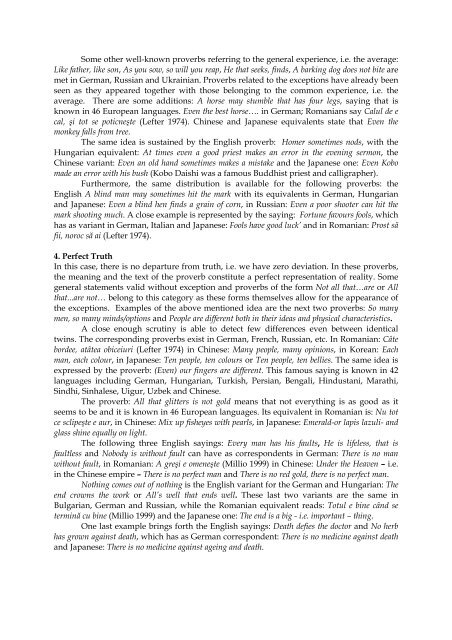Vol. 5/2009 - Facultatea de Litere
Vol. 5/2009 - Facultatea de Litere
Vol. 5/2009 - Facultatea de Litere
Create successful ePaper yourself
Turn your PDF publications into a flip-book with our unique Google optimized e-Paper software.
Some other well-known proverbs referring to the general experience, i.e. the average:<br />
Like father, like son, As you sow, so will you reap, He that seeks, finds, A barking dog does not bite are<br />
met in German, Russian and Ukrainian. Proverbs related to the exceptions have already been<br />
seen as they appeared together with those belonging to the common experience, i.e. the<br />
average. There are some additions: A horse may stumble that has four legs, saying that is<br />
known in 46 European languages. Even the best horse…. in German; Romanians say Calul <strong>de</strong> e<br />
cal, şi tot se poticneşte (Lefter 1974). Chinese and Japanese equivalents state that Even the<br />
monkey falls from tree.<br />
The same i<strong>de</strong>a is sustained by the English proverb: Homer sometimes nods, with the<br />
Hungarian equivalent: At times even a good priest makes an error in the evening sermon, the<br />
Chinese variant: Even an old hand sometimes makes a mistake and the Japanese one: Even Kobo<br />
ma<strong>de</strong> an error with his bush (Kobo Daishi was a famous Buddhist priest and calligrapher).<br />
Furthermore, the same distribution is available for the following proverbs: the<br />
English A blind man may sometimes hit the mark with its equivalents in German, Hungarian<br />
and Japanese: Even a blind hen finds a grain of corn, in Russian: Even a poor shooter can hit the<br />
mark shooting much. A close example is represented by the saying: Fortune favours fools, which<br />
has as variant in German, Italian and Japanese: Fools have good luck’ and in Romanian: Prost să<br />
fii, noroc să ai (Lefter 1974).<br />
4. Perfect Truth<br />
In this case, there is no <strong>de</strong>parture from truth, i.e. we have zero <strong>de</strong>viation. In these proverbs,<br />
the meaning and the text of the proverb constitute a perfect representation of reality. Some<br />
general statements valid without exception and proverbs of the form Not all that…are or All<br />
that...are not… belong to this category as these forms themselves allow for the appearance of<br />
the exceptions. Examples of the above mentioned i<strong>de</strong>a are the next two proverbs: So many<br />
men, so many minds/options and People are different both in their i<strong>de</strong>as and physical characteristics.<br />
A close enough scrutiny is able to <strong>de</strong>tect few differences even between i<strong>de</strong>ntical<br />
twins. The corresponding proverbs exist in German, French, Russian, etc. In Romanian: Câte<br />
bor<strong>de</strong>e, atâtea obiceiuri (Lefter 1974) in Chinese: Many people, many opinions, in Korean: Each<br />
man, each colour, in Japanese: Ten people, ten colours or Ten people, ten bellies. The same i<strong>de</strong>a is<br />
expressed by the proverb: (Even) our fingers are different. This famous saying is known in 42<br />
languages including German, Hungarian, Turkish, Persian, Bengali, Hindustani, Marathi,<br />
Sindhi, Sinhalese, Uigur, Uzbek and Chinese.<br />
The proverb: All that glitters is not gold means that not everything is as good as it<br />
seems to be and it is known in 46 European languages. Its equivalent in Romanian is: Nu tot<br />
ce sclipeşte e aur, in Chinese: Mix up fisheyes with pearls, in Japanese: Emerald-or lapis lazuli- and<br />
glass shine equally on light.<br />
The following three English sayings: Every man has his faults, He is lifeless, that is<br />
faultless and Nobody is without fault can have as correspon<strong>de</strong>nts in German: There is no man<br />
without fault, in Romanian: A greşi e omeneşte (Millio 1999) in Chinese: Un<strong>de</strong>r the Heaven – i.e.<br />
in the Chinese empire – There is no perfect man and There is no red gold, there is no perfect man.<br />
Nothing comes out of nothing is the English variant for the German and Hungarian: The<br />
end crowns the work or All’s well that ends well. These last two variants are the same in<br />
Bulgarian, German and Russian, while the Romanian equivalent reads: Totul e bine când se<br />
termină cu bine (Millio 1999) and the Japanese one: The end is a big - i.e. important – thing.<br />
One last example brings forth the English sayings: Death <strong>de</strong>fies the doctor and No herb<br />
has grown against <strong>de</strong>ath, which has as German correspon<strong>de</strong>nt: There is no medicine against <strong>de</strong>ath<br />
and Japanese: There is no medicine against ageing and <strong>de</strong>ath.<br />
123












